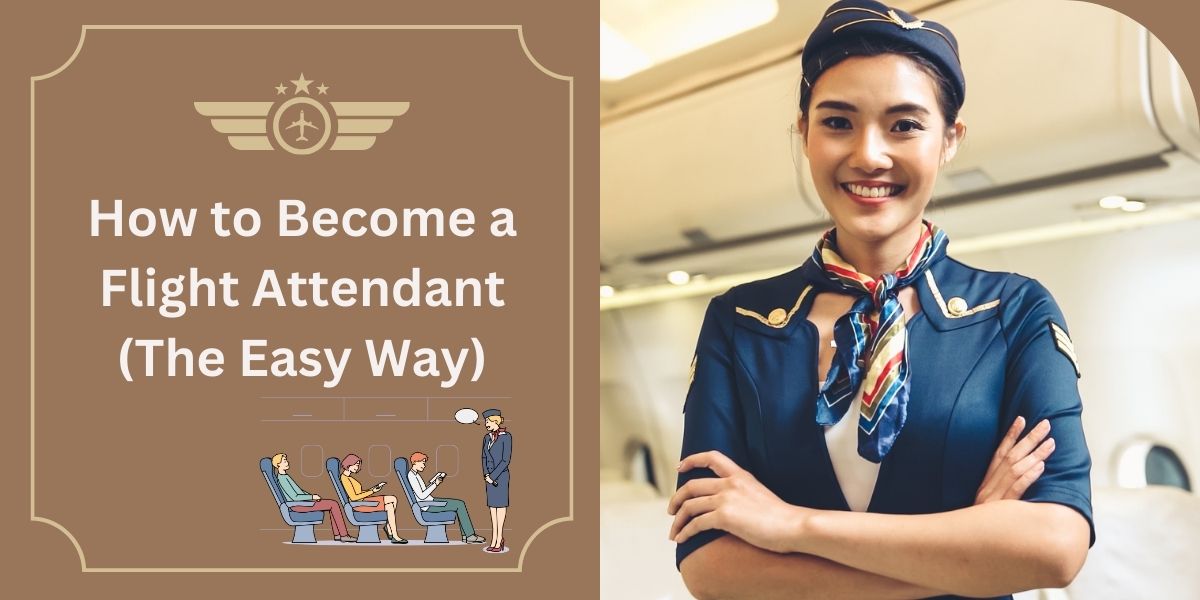For those aspiring to become flight attendants, understanding the diverse responsibilities of this role is essential. Flight attendants assist passengers on commercial and business airlines.
These professionals have a broad range of duties that begin before the flight takes off and continue until each passenger is safely on the ground at their destination. Understanding the scope of a flight attendant’s career can help you determine whether this job is the right fit for your lifestyle.
In this article, we will discuss how to become a flight attendant, including their responsibilities, requirements, pros, and cons.
What are the responsibilities of a flight attendant?
If you want to become a flight attendant, here is an outline of their responsibilities
- Participate in briefings with the pilots to discuss cabin conditions and flight details.
- Conduct inspections of emergency equipment.
- Demonstrate the use of safety equipment and emergency equipment.
- Ensure that passengers have their seatbelts fastened when required and that they observe all other safety requirements.
- Checking supplies and stock before the flight.
- Serve and sell beverages, meals, or snacks.
- Take care of passengers’ needs, particularly children, older people, and those with support needs.
- Reassure passengers during the flight, such as when the aircraft hits turbulence or during bad weather.
- Administer and coordinate emergency medical care when needed.
- Provide direction to passengers, including how to evacuate the aircraft in an emergency.
- Checking passengers’ documents, such as boarding passes.
- Ensuring passengers are comfortable.
- Making announcements.
- Responding to passenger requests and answering any questions they may have.
- Ensuring luggage is stored securely in the overhead lockers or under seats.
How to Become a Flight Attendant
Here’s an overview of how to become a flight attendant in ten steps:
1. Get a high school diploma.
The minimum education requirement for flight attendants is a high school diploma, or GED.
2. Talk to a career counselor.
Speak with a counselor about your intention to become a flight attendant. Your career counselor can help you select the most beneficial coursework to prepare you for this role.
3. Earn a college degree.
While most airlines hire flight attendants without degrees, an associate’s or bachelor’s degree in public relations may improve your job opportunities.
4. Build customer service skills.
Consider working for a year or two in a hospitality or service job to develop your customer service skills. You might work at a restaurant, hotel, or in any role that requires interacting with others.
5. Practice your interview skills.
Show that you’re knowledgeable of flight attendant duties and skills and that you possess customer service skills. Prepare a resume in advance to prove your education and customer service experience.
6. Apply for jobs.
You can apply for flight attendant positions if you’re over 18 years old and have good health and vision.
7. Train.
If an airline hires you, you can train for weeks or months to prepare for FAA certification. Training courses include performing first aid, responding to challenging flight or passenger situations, evacuating, putting out fires, and learning survival skills and self-defense.
8. Get certified.
After you have completed initial training, pass the FAA’s exam to become certified and legally allowed to work as a flight attendant.
9. Complete reserve status.
New flight attendants start on reserve status. During this time, you’re on call to fill in for other flight attendants or extra flights, typically lasting one year.
10. Advance in your career.
After you gain enough experience, you may have the seniority to choose your base, routes, and schedule. You might also mentor, recruit, train, or manage other flight attendants and help with tasks such as scheduling.
Requirements to Become a Flight Attendant
To get hired as a flight attendant, you’re required to be at least 18 or 21 years old, depending on the state or employer, have a current passport, have at least 20/40 vision, and pass a drug test and background check. Additional requirements may include passing a medical examination and meeting an airline’s height requirements.
Here are some other requirements to become a flight attendant:
Education
Flight attendants have at least a high school diploma or GED. Some airlines may prefer a candidate with an associate’s or a bachelor’s degree in subjects like:
- Hospitality
- Public relations
- Tourism
- Communication
- Business
- Nursing
As an alternative, some people enroll in flight attendant school. If you wish to work on international flights, you may find it helpful to take foreign language classes.
Training
Many flight attendants require a year or two of work experience to gain customer service skills. Once hired, they participate in three to six weeks, and sometimes up to six months, of training provided by the airline.
During this training period, flight attendants learn safety and emergency procedures, first aid, flight regulations, and job duties. They also take practice flights to apply their new skills and knowledge.
All flight attendants must complete this initial training to get certified by the Federal Aviation Administration (FAA). This role may require additional job training, depending on the airline’s employer.
Certifications
Flight attendants require certification with one of the following credentials:
FAA Certificate of Demonstrated Proficiency
This certificate, which flight attendants earn by completing their on-the-job training and passing an exam, is mandatory. Flight attendants train for and become certified for each type of aircraft they work on. They also continue receiving training each year to stay certified.
Flight Attendant Certificate Courses
Organizations such as Inflight Institute offer certification programs by type of airline: charter, regional, national, or international.
Their partner airlines require flight attendants to take flight attendant certificate courses, which cover topics ranging from aviation terminology to safety procedures to passenger handling, before being hired.
Skills
Generally, flight attendants enjoy working with people and have strong interpersonal and customer service skills. Some soft skills aspiring flight attendants can develop include:
- Attention to detail: Flight attendants monitor passengers for issues or suspicious activities. They’re meticulous when doing safety checks on equipment and for people.
- Communication: Individuals in this role can communicate clearly and confidently when giving safety demonstrations and interacting with passengers and crew. They’re also courteous and have strong listening skills.
- Customer service: Part of a flight attendant’s job is providing hospitality, which can include answering questions, directing passengers to their seats, and assisting with storing luggage in the overhead bins. They’re friendly and patient when providing services to ensure passengers have a positive flight.
- Stamina: Flight attendants often work long hours, respond to challenging passengers, and handle heavy items, such as luggage and service carts.
- Efficiency: Flight attendants work quickly and efficiently to complete preflight tasks for an on-time departure.
- Leadership: In emergencies, flight attendants take charge and make quick decisions to guide passengers to safety.
- Empathy: It is essential to be sensitive to the needs, feelings, and requests of passengers and your fellow cabin crew members. If you notice a colleague struggling, you should understand and help build trust and facilitate a better and healthier working environment.
- Adaptability and Flexibility: Although you can receive your scheduled flights a few weeks or days in advance, your schedule must be kept free, as you may also be required to be on standby and available to fly at short notice to fill in for a co-worker or respond to an emergency.
What is the average salary for a flight attendant?
The national average salary for a flight attendant is $39,321 per year. Your earnings can vary based on your experience, education, employer, and location.
The United States Bureau of Labor Statistics (BLS) projects flight attendant jobs to grow by 21% between 2021 and 2031. This increase is much faster than the average occupation. Due to this, there might be 18,100 job openings annually.
What is the work schedule of a flight attendant?
Flight attendants typically work 30–40 hours a week, with variations based on the airline, flight lengths, and potential issues. The profession demands commitment to irregular hours, including early mornings, evenings, nights, weekends, and holidays.
Flight attendants may face overnight stays and unpredictable schedules due to delays or cancellations. Employers may offer part-time or flexible options, but unsociable hours remain common. The work environment involves unconventional schedules, on-call duties, and potential last-minute assignments.
Flight attendants may spend nights in hotels, work up to 12 hours a day (regulated by FAA), and face challenges such as responding to emergencies and enduring air turbulence.
What are the pros and cons of becoming a flight attendant?
Becoming a flight attendant is appealing for numerous reasons, but many newcomers don’t realize the drawbacks of the position. For instance, even though flight attendants can travel often, many times that can interfere with celebrating holidays and special occasions.
Another benefit of becoming a flight attendant is that they’re subject to discounted flights at discounted rates. On the other hand, the path to becoming a flight attendant may be longer than applicants anticipated.
Even though a college degree isn’t required to become a flight attendant, the application and training process can be highly selective, and plenty of applicants are regularly turned down.
Conclusion
A flight attendant’s primary responsibility is passenger safety throughout the flight. Acting as a safety officer, inflight customer service representative, and hospitality manager, they play a crucial role in creating a pleasant flying experience. The effective merging of these roles is a hallmark of a skilled flight attendant.
The path to becoming a flight attendant involves a commitment to continuous learning, often starting with meeting the educational and training requirements set by airlines.




 Jobi.ng
Jobi.ng




